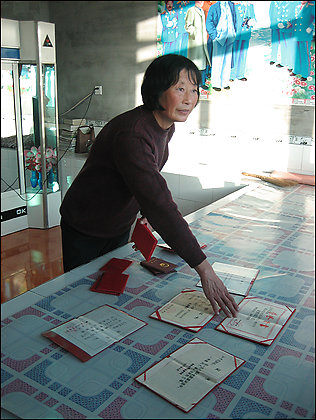

 字體:小 中 大
字體:小 中 大 |
|
|
|
| 2006/12/29 20:10:17瀏覽658|回應2|推薦3 | |
'Barefoot Teachers' Left Behind in By Maureen Fan http://www.washingtonpost.com/wp-dyn/content/article/2006/12/25/AR2006122500490.html 錦州, China -- For more than 30 years, Sun Jingxia taught math and Chinese to elementary school children in this small northeastern village. She was a poor farmer who had not even completed high school. But equipped with a middle school education and a correspondence course from a vocational teaching school, Sun devoted herself to filling a desperate need for teachers in the countryside. She earned $1.60 a month when she began teaching in 1974 and collected a stack of awards and honors over the years. As one of the hundreds of thousands of nonprofessional, or "barefoot," teachers in this country -- peasants with little more than a vocational school certificate who help teach their impoverished neighbors -- Sun was part of a special time in Chinese history. Several years ago, however, government officials announced they wanted to raise the standard of rural education. And now, although many barefoot teachers have qualified to become professionals, Sun and thousands like her have been cast aside. Some have lost their jobs; others, their pride. The manner in which that happened speaks volumes about how difficult and wrenching the modernization of China's creaking socialist system can be, especially for a class of people once celebrated as the heart of the Communist Party. The ideals championed when Sun first began teaching, such as embracing poverty and making do with the best available, have been replaced by a focus on higher incomes and on finding jobs for young college graduates. Now, barefoot teachers are just in the way. "I devote my whole life to this school," Sun said. "It's so unfair." Some researchers say times have simply changed. To have a sound and balanced education system, they say, "It's just like the laid-off workers in the state-owned enterprises," said 洪俊, a professor at Northeast Normal University's Institute of Rural Education. " What has happened to barefoot teachers, he said, is "the price of reform." The plight of those teachers also illustrates how difficult it can be for Chinese leaders to improve conditions in the countryside while staving off rural unrest. The teachers are now joining the swelling ranks of petitioners -- a group Barefoot teachers here in 遼寧 province were not supposed to have been shoved aside. Officials in the provincial capital of 瀋陽 said teachers like Sun could be promoted to professional status, which would pay three to six times more than what they had been earning. To make the shift, though, they had to meet certain conditions. One was to pass a test. Sun recalled being so nervous that day in 2002 that her hands shook as she signed her name on the first page of the examination. She hadn't slept for two days, so her vision was blurry. Her reputation, career and long-awaited chance to raise her income all were at stake. After the test, she said, she asked about her score, but her principal at first professed ignorance. Later, when she ran into him in the village market and demanded to know the truth, he told her that even with extra credit for her experience and awards, she had failed by one point. Sun said she crumpled into a heap by the side of the road, her bicycle clattering to the ground beside her. "The test was not difficult; I knew the answers," Sun, 53, said in a halting voice. "I was sick, and I was so nervous because this is the exam that will determine my fate. But I never expected I would fail it." In 錦州, about 2,900 barefoot teachers were promoted to professional status after the test, according to Wang Yinghua, 52, a barefoot teacher from a village 30 miles northwest of Sun's home. About 800 were dismissed from their jobs. Wang was one of those dismissed, 27 years after starting work as a teacher. She had failed the exam by four points. The government, Wang explained, had said "barefoot teachers should be treated the same as professional teachers when they retire, that they will gradually make all qualified barefoot teachers into professional teachers, step by step." But as Wang and others learned, it didn't work that way. Instead, they say, the system was undermined by corruption. Shortly after the test, the peasant teachers of 錦州 began to hear stories about people promoted to professional status despite not having graduated from middle school, one of the necessary qualifications. They discovered former barefoot teachers who had not passed the exam. And they heard that some had bought their positions by paying local officials up to $6,400. "As soon as I learned I had failed and there was corruption involved, we began to petition," Sun said. "In July, we went to the 錦州 municipality government office building. There were 200 barefoot teachers, and we sat in their yard for four days. None of us could afford a hotel; we just slept on the ground." That protest lasted more than a month, according to Wang. There were larger sit-ins in 瀋陽 late last year and again in March, June and July. "Many of the new professional teachers are not even as good as us," Wang said. "Some are shoe sellers from the market. Some are butchers. One is even mute. He doesn't teach, but collects the salary and pays a cheap substitute to teach in his place. His father is a township government official." Said Sun: "There is a professional teacher in my school, I won't mention her name. Her name is not on the list of people who passed the exam. She wasn't even a barefoot teacher before. I heard her family paid the education bureau. There are many people like her in every town in this place." Sun's principal denied that any of his teachers had bought a professional position. "No, of course not. . . . You have to go through a lot of procedures," said Zhao Dianping, principal of the 700-student Asked if there were any exceptions, Zhao said yes, "red position workers," but would not elaborate. "I've already told you too much," he said. Thousands of barefoot teachers have been pushed out of their jobs in at least three provinces besides 遼寧. Though government officials consider the issue of barefoot teachers resolved, many rural schools still have a shortage of instructors. Zhao has been forced to hire substitute teachers. Some are former barefoot teachers; some have even less training. Sun and Wang are among the barefoot teachers who have been hired as substitutes, but they say it is a small consolation. Sun's principal invited her back three months after she failed the test. "The money is not much, but I know you cannot leave your students," he told her. She could barely bring herself to make eye contact with the other teachers in the school. "When I saw my colleagues, I couldn't hold my tears," Sun said. "All my colleagues dropped their heads and looked at the floor." Wang's barefoot colleagues include a 43-year-old teacher who now operates a rickshaw and a 46-year-old woman who has become a migrant worker. Both are now paid more than they were as teachers, but the money is not the point, Wang said. It is a matter of pride. "We loved this position. Though we earned little, all we want to do is work hard and contribute to this country. This is about my reputation, our dignity," she said. "I've been working as a teacher all of my life, and they say I'm unqualified at this age? It is the barefoot teachers who helped Researcher Jin Ling contributed to this report. 在窮鄉僻壤奉獻一輩子 教育改革 赤腳老師被逼退 中國時報 A23/兩岸新聞 2006/12/28 【白德華/外電報導】 |
|
| ( 時事評論|兩岸 ) |










